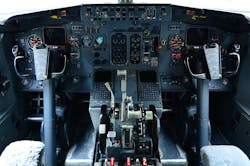FAA Orders Inspections for All 737s
The U.S. Federal Aviation Administration (FAA) directed all operators of Boeing 737 series aircraft to test cabin-altitude pressure switches – and replace them as necessary – in response to reports that those switches failed the on-wing function test on three different 737 models.
The order covers 9,315 aircraft worldwide, of which 2,502 are 737 jets operated by U.S. carriers. The problem is unrelated to various problems that have affected the 737 MAX aircraft over the past two-and-a-half years, and both the MAX and preceding 737 Next Generation versions of Boeing’s twin-engine, narrow-body series are included in FAA’s directive.
The twin-engine, narrow-body 737 is Boeing’s best-selling aircraft. Neither FAA nor Boeing has determined the cause of the switches’ failure.
According to FAA, the failure of cabin altitude pressure switches could lead to loss of function for the cabin-altitude warning system above 10,000 feet, a point at which oxygen levels could become dangerously low and impair passengers and crew members.
The tests are to be conducted within 2,000 flight hours following the most recent test of the cabin-altitude pressure switches, before an aircraft has flown 2,000 hours, or within 90 days of the directive's effective date.
The FAA’s order stems from one unidentified carrier’s September 2020 report that both pressure switches on three separate 737 models failed the function tests. Reportedly, Boeing reviewed the issue and concluded it did not pose a safety issue.
Now, however, Boeing has backed FAA’s directive, and noted it makes mandatory a new “inspection interval” for 737 jets that the OEM announced in June.
